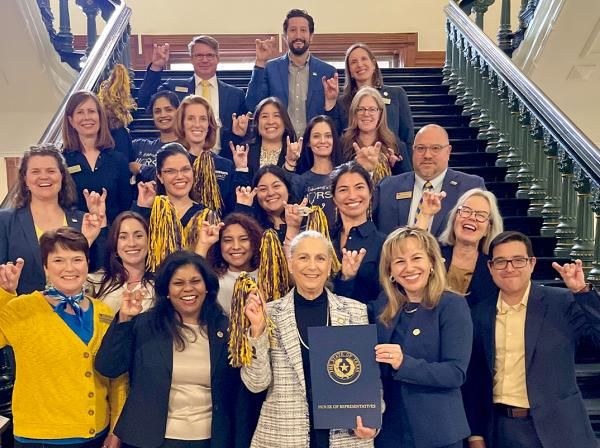Empowering Citizen Science
Viewpoint: For Gary Morris, dean of the School of Natural Sciences, every citizen has a role to play in the advancement of scientific discovery.
Imagine you’re heading out for a long weekend in the mountains of West Texas. You check the Weather Underground app, which shows you the temperature at hundreds of weather stations people have set up in their backyards and connected to the web. Scanning the temperatures along your route, you decide to grab a jacket for the last leg of your trip, where it’s 15 degrees cooler.
At your destination, you take a short hike and encounter a plant you’ve never seen before. You upload the photos on your phone to the iNaturalist app and within minutes another user has responded to identify it. That night, as you look up at the sky, you marvel at how many stars you can see. You occasionally take measurements of night-sky brightness and submit them to NASA for its research on light pollution. The difference between the darkness of the sky at home and out here is striking.
All three of these projects are examples of citizen science — projects that invite the public to collect and analyze data for the advancement of scientific discovery — a pursuit that is gaining in popularity and is now recognized on April 13th, National Citizen Science Day. As professional scientists, my colleagues and I should do more to embrace such efforts not only for their contributions to research projects but also because they build appreciation for science in the general public. Similarly, to raise scientific literacy and contribute to the scientific progress, members of the public should get involved in citizen science, which harnesses the power of small efforts by thousands of people to contribute to studies of some big local and global problems: air and light pollution, climate change, biodiversity, land use, asteroid hunting and more.
We live in an era during which high-quality, relatively inexpensive technologies can democratize meaningful participation in the scientific endeavor. Highly controlled experimental environments will always be necessary, but it’s certainly not the case that valuable scientific research takes place only in government or university labs. Particularly when it comes to big data collection, everyday citizens can contribute to scientific research projects on their own schedule and a very low cost. Indeed, I would argue that anyone who uses apps to track their heart rate, number of steps or sleep is already contributing by providing data that at the very least engage users in the study of their own health, but that also could be useful in a much larger scientific study about health risks and well-being.
In an era of citizen science, my colleagues and I can worry less about the prospect that involving nonscientists in data collection may compromise the accuracy of any individual data points. When the data sets were small or sparse, a single incorrect observation could skew our results. But these days, the sheer volume of data overwhelms the potential errors associated with any given observation.
When professional scientists circle back to citizen scientists and let them know, “Hey! Look what your data helped us to figure out,” public understanding about and motivation to support the scientific enterprise deepens, which ultimately could lead to more funding for science. In addition, such engagement has the potential to reinforce the validity of science among segments of society susceptible to the arguments of those who doubt climate change or the efficacy of vaccines. When a person’s own weather monitor is contributing temperature data that shows climate change, he or she might feel more confident in scientists’ conclusions about the results as well. There is nothing like seeing something in your own backyard. Furthermore, universities could create reports and host forums for their local communities to discuss citizen science data and its implications as ways to both educate and advance scientific understanding.
Even when the citizen participation is completely passive — such as setting up a weather station in your backyard, connecting it to the internet and then forgetting about it — the act still builds a connection between the participant and the scientific enterprise. Universities like St. Edward’s, where I work, can strengthen that connection by helping citizens calibrate their equipment, developing student research projects that use citizen-collected data, and completing the feedback loop so people understand how they’re contributing to the scientific enterprise.
All Americans should join citizen science projects — SciStarter or zooniverse.org are good places to start — both as a way to learn more about their world and as a means of contributing to some basic and cutting-edge scientific research. And the academy should make it easy and meaningful for them to do so, by holding training days, helping people calibrate their equipment and showing them what professional researchers have done with their data.
Both professional scientists and the general population benefit from greater public engagement in science. Citizen science projects harness the power of public interest and big data to the benefit of us all.
A version of this Op-ed appeared in the Austin American Statesman.



